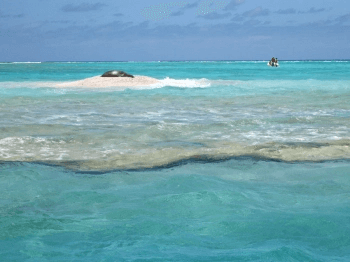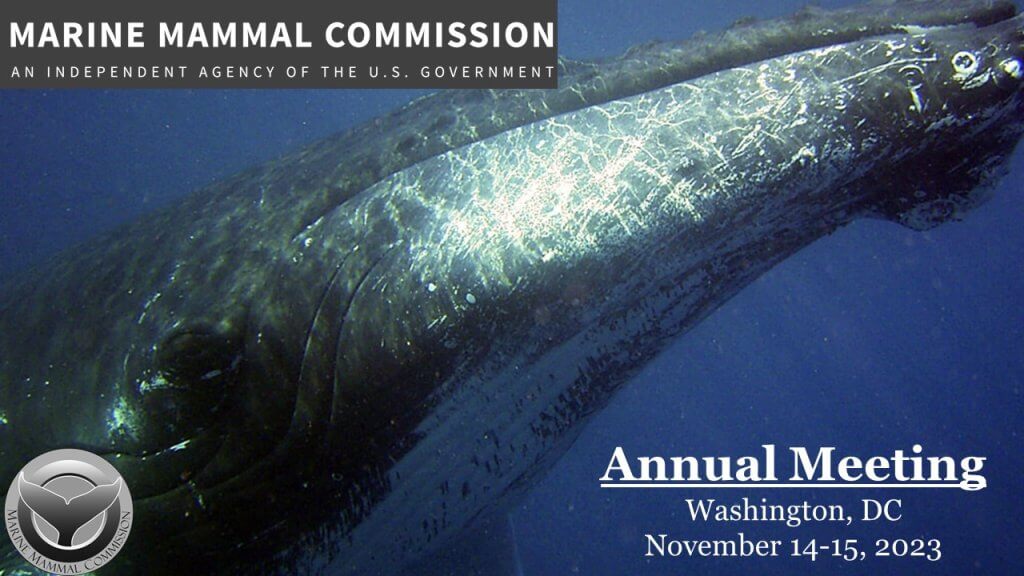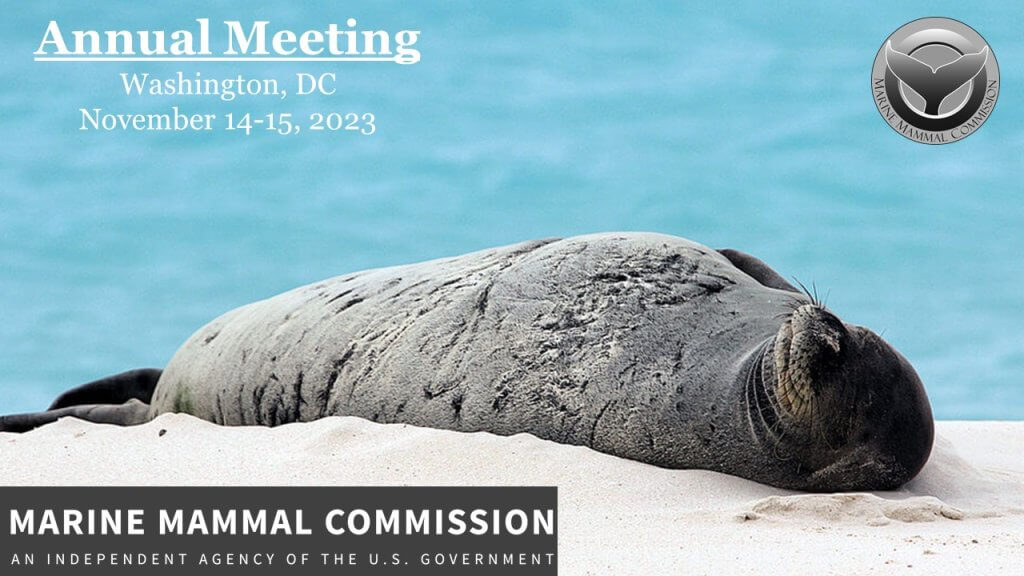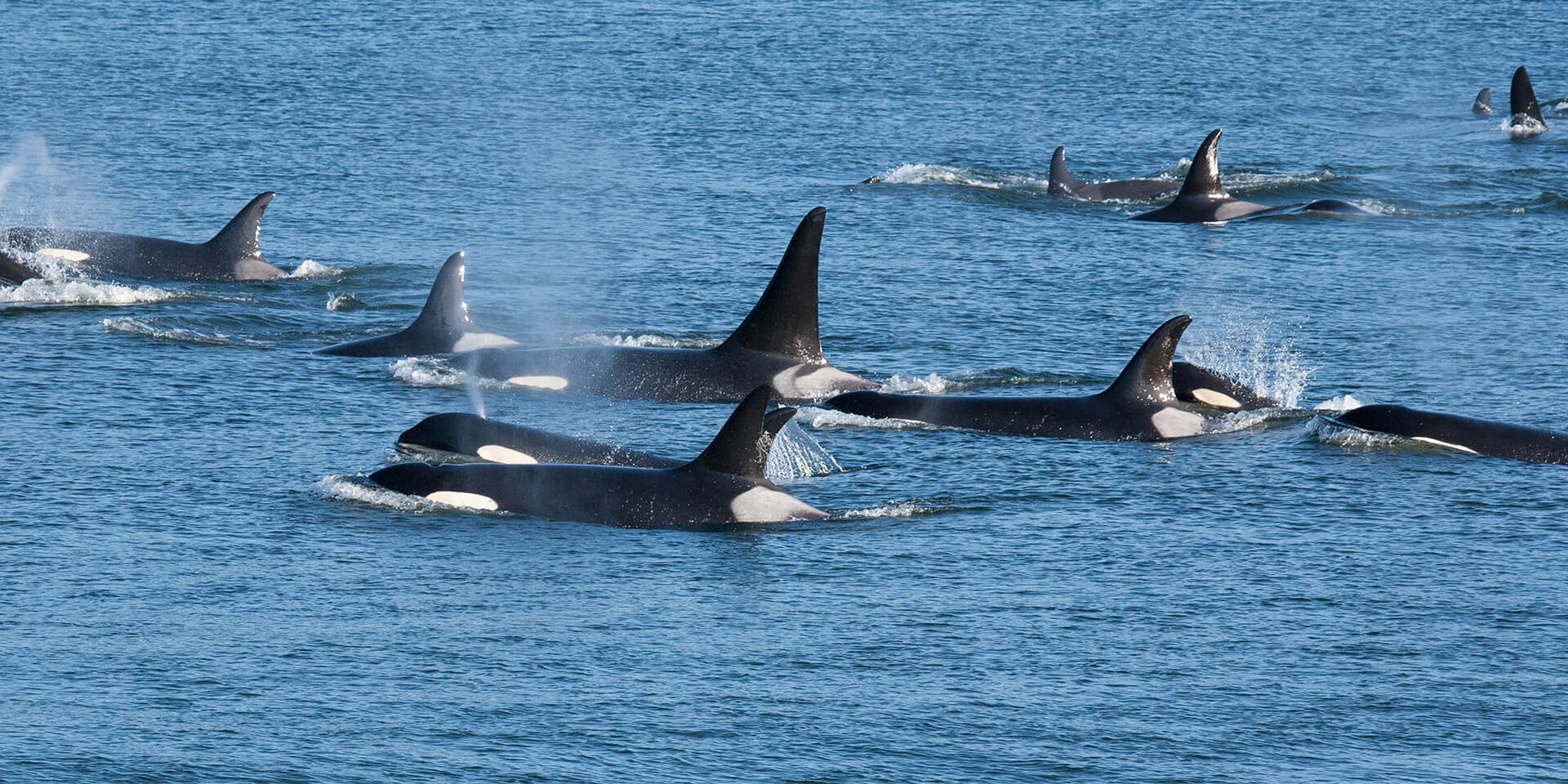2023 Annual Meeting
ESA at 50: Challenges in a Changing Climate

An endangered Hawaiian monk seal resting on a small sand spit (Credit: Louise Giuseffi, NOAA #16163-01).
The Commission held its 2023 Annual Meeting on November 14-15 in Washington, D.C., focused on national marine mammal science and management issues and celebrating 50 years of the Endangered Species Act and Marine Mammal Protection Act. The Commission works with agency partners to implement these acts, including the National Marine Fisheries Service (NMFS) at the Department of Commerce, and the US Fish and Wildlife Service (FWS) and the US Geological Survey (USGS) at the Department of the Interior. These laws have led to successes and challenges; some species have recovered, others have not, and all are facing the impacts of climate change. Throughout the meeting, we used case studies of threatened and endangered marine mammals to explore national-level issues related to stock assessment, health surveillance and other management needs in a changing climate. The meeting was public and open to all.
Meeting Recordings
Visit the Commission’s YouTube Channel for video recordings of the meeting. Look for each session’s corresponding recording along the right side of this page.
Meeting Materials
Click here for a PDF copy of the draft agenda. The meeting schedule, presentations, and recordings are below.
Day 1: Tuesday November 14
8:30-9:00 AM: Public Meeting Begins
- Welcome and Introduction to the Meeting
Peter Thomas, Executive Director, Marine Mammal Commission (MMC)

9:00-12:00 PM: Ecology and Ecosystem Dynamics Part 1: Shifting Distribution, Prey, and Threats
Moderator: Daniel Palacios, Associate Professor, Marine Mammal Institute, Oregon State University and Scientific Advisor, MMC
- Introduction to shifting distribution, prey, and threats (see video recording)
Daniel Palacios, Associate Professor, Marine Mammal Institute, Oregon State University and Scientific Advisor, MMC - Climate-driven shifts in right whale reproduction, distribution, and risk exposure
Erin Meyer-Gutbrod, Assistant Professor, University of South Carolina (as presented by Sean Hayes, Chief, Protected Species Division, NMFS Northeast Fisheries Science Center) - Shifting spatial and temporal marine mammal distributions in the Pacific Arctic
Kate Stafford, Associate Professor, Marine Mammal Institute, Oregon State University - The Guadalupe fur seal: Recovery and climate change
Fernando Elorriaga-Verplancken, Professor, Interdisciplinary Center for Marine Sciences of the National Polytechnic Institute - Assessing and mitigating entanglement risk of humpback whales in the dynamic California Current Ecosystem
Karin Forney, Research Biologist, NMFS Southwest Fisheries Science Center and Scientific Advisor, MMC - Integrating marine mammal data into regional ocean observing systems for Harmful Algal Bloom early warning systems and ecosystem health assessment (see video recording)
Clarissa Anderson (pre-recorded)*, Director, Southern California Coastal Ocean Observing System - Morning Break
- Shifting Distribution, Prey, and Threats Panel Discussion
Panelists in Additions to Presenters:
- Sean Hayes, Chief, Protected Species Division, NMFS Northeast Fisheries Science Center
- Donna Hauser, Research Assistant Professor, International Arctic Research Center, University of Alaska Fairbanks and Alaska Arctic Observatory and Knowledge Hub
- Carl Gouldman, Director, Integrated Ocean Observing System Office
1:30-3:45 PM: Ecology and Ecosystem Dynamics Part 2: Habitat Alterations
Moderator: Robert Suydam, Senior Wildlife Biologist, North Slope Borough (retired) and Scientific Advisor, MMC
- Introduction to climate-driven changes to marine mammal habitats
Robert Suydam, Senior Wildlife Biologist, North Slope Borough (retired) and Scientific Advisor, MMC - Hawaiian monk seal—Terrestrial habitat loss due to climate change and potential mitigation
Jason Baker, Marine Biologist, NMFS Pacific Islands Fisheries Science Center and Scientific Advisor, MMC - Pacific walrus – Sea ice loss driven alterations of walrus behavioral ecology
Tony Fischbach, Research Wildlife Biologist, USGS Alaska Science Center - Ice seals – Effects of climate change on ice seal habitat
Michael Cameron, Polar Ecosystems Program Manager, NMFS Alaska Fisheries Science Center - Yangtze finless porpoise – Intervention efforts to relocate porpoises to counteract impacts of human activity exacerbated by climate change
Mei Zhigang, Associate Professor, Institute of Hydrobiology, Chinese Academy of Sciences (as presented by Randy Reeves, Okapi Wildlife Associates and Chair of the Committee of Scientific Advisors, MMC) - Habitat Alterations Panel Discussion
Panelists in Additions to Presenters:
- Brian Smith, Senior Advisor, Wildlife Conservation Society

Day 2: Wednesday November 15
8:45-11:45 AM: Marine Mammal Health in a Changing Climate
Marine Mammal Health in a Changing Climate Session Recording
Moderator: Randall Wells, Director of Sarasota Dolphin Research Program and Scientific Advisor, MMC
- Introducing ONE Health and potential climate effects on population health
Frances Gulland, Research Associate, University of California Davis, and Chair, MMC - Hawaiian monk seal research program, exemplar of successful conservation medicine approach
Michelle Barbieri, Supervisory Veterinary Medical Officer, NMFS Pacific Islands Fisheries Science Center - Southern sea otter recovery, exemplar of climate-related contingencies
Chris Kreuder Johnson, Professor of Medicine & Epidemiology, University of California Davis - Surveillance and management strategies to address climate change and wildlife health
Jonathan Sleeman, Science Advisor for Wildlife Health for the U.S. Geological Survey - NMFS Marine Mammal Health and Stranding Response Program at 30: Statutory mandates and future directions in a changing climate
Kim Damon-Randall, Director, NMFS Office of Protected Resources - Vision for a nationwide Marine Mammal Health Monitoring & Surveillance Plan in a changing climate
Lori Schwacke, Scientific Program Director, MMC - Morning Break
- Detecting Climate Change Impacts through Health Surveillance Panel Discussion
Additional Panelists:
- Carl Gouldman, Director, Integrated Ocean Observing System Office
1:15-4:00 PM: Stock Assessments and Climate Change
Moderator: Jason Baker, Marine Biologist NMFS Pacific Islands Fisheries Science Center, and Scientific Advisor, MMC
- Introduction (see video recording)
Jason Baker, Marine Biologist NMFS Pacific Islands Fisheries Science Center, and Scientific Advisor, MMC - Overview of the NMFS Stock Assessment Reports (SARs) process, and considerations of climate change
Eric Patterson, Cetacean and Pinniped Conservation Lead, NMFS Office of Protected Resources - Integrating climate projections into the management and conservation of polar bears: challenges and opportunities
Dave Gustine, Manager/Supervisory Biologist – Polar Bears, FWS Alaska Marine Mammals Management Office - Marine Mammal Climate Vulnerability Assessments
Matt Lettrich, Protected Species Climate Vulnerability Assessment Lead, ECS Contractor supporting NMFS Office of Science and Technology - How climate change could/is impacting SARs and how we have to adapt the science
Erin Oleson, Supervisory Research Ecologist, Cetacean Research Program, NMFS Pacific Islands Fisheries Science Center - Tribally-led stock assessments utilizing Indigenous Knowledge
Raven Cunningham, Tribal Fish & Wildlife Director, Chugach Regional Resources Commission - Afternoon Break
- Stock Assessment and Climate Change Panel Discussion
4:00-5:00 PM: Whales on the Brink Discussion
Moderator: Andy Read, Director, Duke University Marine Laboratory, and Commissioner, MMC
- Panel Discussion
- Laura Engleby, Chief, Marine Mammal Branch, NMFS Southeast Regional Office
- Lance Garrison, Research Fishery Biologist, NMFS Southeast Fisheries Science Center
- Anne Marie Eich, Assistant Regional Administrator for Protected Resources, NMFS Alaska Regional Office
- John Bengston, Division Director, Marine Mammal Laboratory, NMFS Alaska Fisheries Science Center
- Sean Hayes, Chief, Protected Species Branch, NMFS Northeast Fisheries Science Center
- Diane Borggaard, Right Whale Recovery Coordinator NMFS Greater Atlantic Regional Office
Please feel free to contact us with any questions or feedback.
